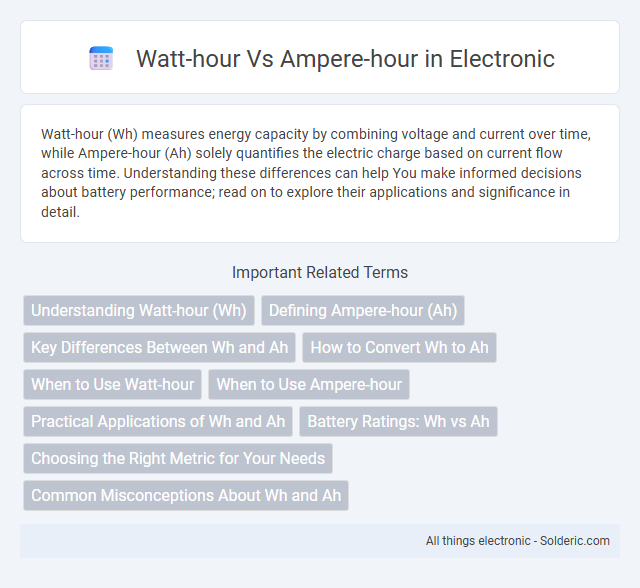Watt-hour (Wh) measures energy capacity by combining voltage and current over time, while Ampere-hour (Ah) solely quantifies the electric charge based on current flow across time. Understanding these differences can help You make informed decisions about battery performance; read on to explore their applications and significance in detail.
Comparison Table
| Aspect | Watt-hour (Wh) | Ampere-hour (Ah) |
|---|---|---|
| Definition | Unit of energy representing the amount of work done by one watt over one hour. | Unit of electric charge representing the load of one ampere over one hour. |
| Measurement | Energy (Power x Time) | Electric charge (Current x Time) |
| Formula | Wh = V x Ah (Voltage x Ampere-hour) | Ah = Wh / V (Watt-hour divided by Voltage) |
| Common Usage | Battery energy capacity, energy consumption | Battery charge capacity, current load duration |
| Units Relation | 1 Wh = 3600 Coulombs x Voltage | 1 Ah = 3600 Coulombs (1 Ah = 3600 C) |
| Example | A 12V battery with 100Ah capacity equals 1200Wh energy. | A battery delivering 2A current for 5 hours has 10Ah capacity. |
Understanding Watt-hour (Wh)
Watt-hour (Wh) represents the total energy stored or consumed by a battery and is calculated by multiplying voltage (V) by ampere-hour (Ah). It quantifies energy capacity, enabling comparison of batteries with different voltages on a common scale. Understanding watt-hour helps in accurately assessing battery runtime and energy delivery for electronic devices and electric vehicles.
Defining Ampere-hour (Ah)
Ampere-hour (Ah) measures electric charge, representing the amount of current transferred by one ampere flowing for one hour. It quantifies battery capacity, indicating how long a battery can supply a specific current before depletion. Unlike watt-hour (Wh), which factors in voltage to measure energy, ampere-hour focuses solely on current and time.
Key Differences Between Wh and Ah
Watt-hour (Wh) measures energy, representing the total amount of power consumed or stored over time, while Ampere-hour (Ah) measures electric charge, indicating the capacity of a battery to supply a certain current for one hour. The key difference lies in units: Wh combines voltage and current (Wh = Ah x V), giving a clearer picture of actual energy, whereas Ah only reflects charge regardless of voltage. Understanding these differences helps you accurately compare battery capacities and energy storage for your devices.
How to Convert Wh to Ah
To convert watt-hours (Wh) to ampere-hours (Ah), divide the watt-hour value by the voltage (V) of the battery or device. The formula is Ah = Wh / V, which provides the charge capacity in ampere-hours. This conversion is essential for accurately comparing battery capacities across different voltages.
When to Use Watt-hour
Watt-hour (Wh) is the preferred unit for measuring energy consumption and capacity because it accounts for both voltage and current, providing a more accurate representation of total energy stored or used. Use Watt-hour when comparing battery capacities across different voltage systems or calculating the actual power output over time in devices and energy storage. This unit is essential for understanding overall energy efficiency and for making informed decisions in power management and battery selection.
When to Use Ampere-hour
Ampere-hour (Ah) is ideal when measuring battery capacity in terms of total charge stored, especially for devices with a constant voltage but varying current draw, such as automotive or portable electronics batteries. It provides a clear indication of how long a battery can supply a certain current, making it essential for evaluating battery life and usage in amp-based equipment. Watt-hour is more suitable when considering overall energy consumption or comparing batteries with different voltages.
Practical Applications of Wh and Ah
Watt-hour (Wh) is essential for measuring the total energy storage capacity of batteries, making it ideal for evaluating devices like laptops, smartphones, and electric vehicles where energy consumption over time is critical. Ampere-hour (Ah) quantifies the electrical charge a battery can deliver, useful for comparing battery sizes and run-time in applications such as portable power tools and uninterruptible power supplies (UPS). Understanding both Wh and Ah helps optimize battery selection based on energy needs and current requirements in practical scenarios.
Battery Ratings: Wh vs Ah
Battery ratings in Watt-hours (Wh) indicate the total energy capacity of a battery, reflecting both voltage and current over time, whereas Ampere-hours (Ah) measure only the charge capacity based on current flow. Understanding Wh provides a clearer picture of how long your device can run at a specific power level, while Ah is useful for comparing batteries with the same voltage. Choosing the right unit depends on your need to evaluate either energy content or charge capacity for optimal battery performance.
Choosing the Right Metric for Your Needs
Selecting between watt-hour (Wh) and ampere-hour (Ah) depends on the specifics of your energy storage or consumption assessment. Watt-hour measures actual energy capacity by combining voltage and current over time, making it suitable for understanding total usable power in devices like batteries and solar panels. Ampere-hour indicates charge capacity based solely on current flow and time, often used for comparing battery size but less precise for energy equivalence across different voltage systems.
Common Misconceptions About Wh and Ah
Watt-hour (Wh) and Ampere-hour (Ah) are often confused because both relate to battery capacity, but Wh measures energy while Ah measures electric charge. A common misconception is that Ah alone indicates battery energy, but you must multiply Ah by voltage (V) to get Wh, which reflects actual stored energy. Understanding this difference helps you accurately compare battery performance and make better decisions for your power needs.
Watt-hour vs Ampere-hour Infographic

 solderic.com
solderic.com